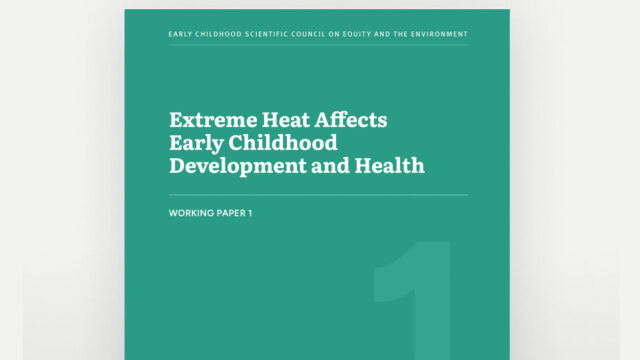Extreme Heat Affects Early Childhood Development and Health

Personal experience, common sense, and science confirm that temperatures are rising globally. Heat waves are occurring with greater frequency and lasting longer than ever before. According to the World Meteorological Organization, 2023 is believed to have been the hottest year on record.
Humans have successfully adapted to a wide range of climates, but there are limits to our tolerance and climatic conditions beyond which our bodies cannot cool themselves sufficiently. While the dangers of excessive heat to certain populations, such as the elderly, are well-known, its effects on pregnancy, infancy, and childhood receive less attention.
Extreme heat affects infants and young children more than most adults—and potential impacts on their health and development can be lifelong. Because all children should have the opportunity to thrive, it is critical that we understand how extreme heat affects children and then determine how best to take action.
This working paper from the Early Childhood Scientific Council on Equity and the Environment explores how extreme heat can affect young children’s biological systems and disrupt development, as well as the many ways it can amplify the effects of systemic inequities.
The paper also offers strategies to mitigate the impact of extreme temperatures and provide new ways of cooling the communities where children live, grow, learn, and play. In the accompanying Action Guide for Policy, you can also explore promising opportunities and community-informed solutions already seeing progress.
Sections include:
- How the human body responds to excessive heat.
- The powerful effects that extreme temperatures can have during pregnancy and early childhood, including impacts on learning, sleep quality, and mental and behavioral health.
- How heat amplifies systemic inequities, including air quality, access to nutritious foods, and structural disadvantages.
- Practical solutions for working to mitigate climate change, slow the heating of our environment, and provide new ways of cooling our communities.
- Implications for new directions in policy.
Suggested citation: Early Childhood Scientific Council on Equity and the Environment (2023). Extreme Heat Affects Early Childhood Development and Health: Working Paper No. 1. Retrieved from www.developingchild.harvard.edu